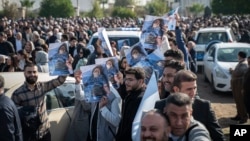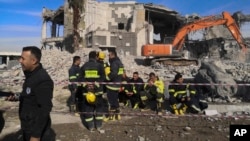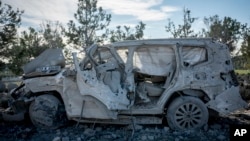Kurdistan Region’s authorities are grappling with the consequences of a deadly Iranian missile attack on their capital city this week, as officials question the will of the Iraqi government and the loyalty of the U.S. government to help them deal with increasing Iranian pressure.
“If the Iraqi government does not take a serious stance against these attacks, there will be no meaning left of Iraq’s sovereignty,” Peshawa Hawramani, the spokesperson of the Kurdistan Regional Government of Iraq, told VOA.
“Countries sometimes summon each other's ambassadors and withdraw their own ambassadors over a simple statement. I do not know what worse can be done against [Iraq], you have been attacked by ballistic missiles and you have no response,” Kurdish spokesperson Hawramani told VOA.
Iran’s Revolutionary Guards, or IRGC, on Monday launched several ballistic missiles at the Kurdistan Region’s Irbil city and province, killing two businessmen, a toddler and a Filipino woman.
The IRGC and Iranian foreign ministry have said the attack targeted an Israeli espionage center in Irbil.
Kurdish and Iraqi officials have rejected Iran’s claims, with the Iraqi foreign ministry announcing yesterday that it will file a complaint about Iran with the U.N. Security Council.
Additionally, both the Kurdish and Iraqi prime ministers canceled scheduled meetings Wednesday with Iranian Foreign Minister Hossein Amir-Abdollahian during the World Economic Forum in Davos.
But Kurdish officials, whose region is facing increasing pressure from Iran, are questioning what else the governments of Iraq and the United States will do to protect them.
Omed Xoshnaw, the governor of Irbil, told VOA he believes the attack by Iran, which among other places, destroyed the house of a prominent Kurdish oil and real estate businessman, was an extension of a regional plan to diminish the status of Kurdistan Regional Government, or KRG, as a pro-U.S. entity.
“If Iran wants to fight Israel, Israel's location is obvious, and it has its own land,” Xoshnaw told VOA. He said the targeting of Kurdish businessmen was intended to squeeze the Kurdish economy, which has been suffering for years because of financial disputes with a pro-Iranian government in Baghdad.
“War is being waged against the Kurdistan Region from all sides; cutting the KRG salaries and budget shares, using the Iraqi federal court, and failing to implement the agreements upon which the Iraqi government was formed, are all interrelated,” Xoshnaw said. “Targeting investors' homes is part of the blow to the region's economy and a message that they do not want Kurdistan to develop further.”
Kurdish officials have publicly stated to their citizens that regional and international power dynamics have not been in their favor since the territorial defeat of the Islamic State terror group by a U.S.-led coalition in which Kurds played a major role.
In September 2017, following a Kurdish referendum for independence, Iran helped Iraqi forces take over “disputed territories” from the Kurdistan Region. The Kurdish region has since found itself losing leverage in disputes with the central government. Turkey’s March 2023 decision to stop Kurdish oil exports only made matters worse.
Similarly, in Syria, the Kurdish administration has been under pressure, particularly after recent Turkish attacks that local monitor groups say have targeted essential infrastructure.
Lacking many options, Kurds are hoping they can gain the sympathy of friendly allies such as the United States, which has called Kurds “reliable partners” in the region.
Kurdish Prime Minister Masrour Barzani left for Davos before the attack to attend the World Economic Forum. He is now using the opportunity to meet with global leaders and appeal for support.
“The prime minister of the Kurdistan Region will meet with all countries in Davos, and we ask them not to remain silent about the killing and injury of Kurdish children on groundless justifications,” KRG spokesperson Peshawa Hawramani told VOA.
After a meeting Tuesday with Barzani, U.S. State Secretary of State Anthony Blinken said on X that Kurdistan Regional Government is “a close partner” of the United States and that Washington “unequivocally condemns Iran’s aggression.”
On Wednesday, Barzani met with French President Emmanuel Macron, who, according to a statement by the Kurdistan Regional Government, reiterated his country’s “full support” for Kurdistan region.
Some Kurdish officials and politicians remain skeptical, however, that the West will do anything more than issue statements of support in response to Iran’s attacks.
Mahmoud Osman, a renowned Kurdish politician and a close associate of Kurdish iconic leader Mustafa Barzani, charged that Kurds needed to balance their relations with Iran to make sure they are not victims of the conflict triggered by the Israel-Hamas war.
“Iran is a great threat on Kurdistan and can inflict a lot of damage,” Osman told VOA via phone from his home in Irbil. “The Kurds cannot avoid regional warfare but must be vigilant and maintain a balance between the major powers and must not rely solely on the United States, because the United States will not protect them. Iran's policy is to play a major role in the region.”
This story originated in VOA’s Kurdish Service with contributions by Snur Karim and Dilshad Anwar from Sulaimaniyah and Kirkuk.



